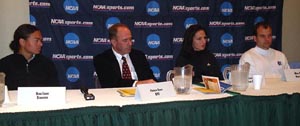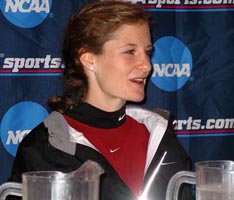2003
NCAA CROSS COUNTRY CHAMPIONSHIPS
Pre-Race
Press Conference
Reported
by Parker
Morse
 |
|
L-R:
Dena Evans, Patrick Shane, Laurie Henes and Michael Whittlesey.
(Photo: New York Road Runners)
|
The
day before the NCAA Cross Country Championships, the host University
of Northern Iowa brought together coaches from the leading men's and
women's teams, and a number of athletes from each race to meet the media.
For the most part, they say nice things about the course for the local
newspapers and, in the case of the coaches, defer to each other about
which teams and athletes are favored. The art of the press conference
is the art of gracefully evading expectations.
Michael
Whittlesey of the University of North Carolina
On
how the race could shape up:
The course creates a lot of opportunities for the athletes to stay focused
on the course. The middle part of the race is gut-check time. That's
where you decide if you want to keep working at that pace.
On
racing North Carolina State so often:
Going head-to-head so often during the season has made us both better.
The ACC meet was one of the most exciting races I've seen...woman-to-woman
all the way.
Laurie
Henes of North Carolina State University
On
where the race was most likely to develop:
Things don't go out quite as quickly in the women's race... The middle
section of the course, perhaps from 3k to 5k, is where everything's
going to happen.
On
the change from 5k to 6k:
I wouldn't have wanted to go from 5k to 6k when I was running. But I
think there's still too big a differential between the mens distance
[of 10k] and the women's distance. We run the same distances in track,
but I think the message that we're sending, that women can only run
6k, isn't good. I don't think 8k would be too long.
On
former 10,000m champion Kristin Price's return to NC State's lineup
in this meet:
[She] had bursitis in her Achilles tendon. She started training a week
before ACCs. We had a hard night before ACCs, because we knew where
we'd be without her, but if we'd lined her up there, we wouldn't have
her here.
Patrick
Shane of Brigham Young University
On
the course:
UNI has done a lot of things to ensure that this meet goes well. I noticed
today that they marked the course with red lines, so they would show
up even if it snows.
On
being ranked number one:
Rankings are interesting and fun, but we don't spend time looking at
them or talking about them. We definitely don't think we're the favorites.
(Joking) Stanford won their regional meet without their third runner,
and we hope they don't run her tomorrow, either. They may not need to.
On paper, we're second.
On
whether that constituted his annual sandbagging:
I truly believe that. We don't spend time talking about winning national
championships. We don't set goals at all in our program. I don't believe
in setting goals. We focus on the process, not the outcomes, and a championship
is an outcome, so that's not something we focus on or talk about. This
year, I think I can honestly say that we're less of a favorite than
we were last year.
On
building a tradition:
We don't put expectations on our athletes, but when younger athletes
come in to a program with a tradition of winning, that's something they
come to expect of themselves, and something they can see is possible.
On
the race distance:
I think the move from 5k to 6k has been a good move. It should have
happened years earlier. Even now, there's a big difference in recovery
times. The men had to race 10k nine days ago, then come back and race
10k again tomorrow. The women only had to race 6k nine days ago, so
they should all be fully recovered. The challenge is completely different
for the men.
Dena
Evans of Stanford
On
Stanford being a contender for the national title:
Our team is no stranger to high-pressure situations. We only have control
over our own performance. We can't control what any other team does.
There are a lot of great teams out there, and there are a lot of people
here who can run for a small number of spots.
Michaela
Manova of Brigham Young University
On
the course and conditions:
I like this course. Last year was boring. We just ran two laps around
a big field. You know where you are on this course. I'm glad it's like
that this year. Today is not cold, really. If it's bad tomorrow, we'll
warm up a little longer, wear another layer and jog around at the start.
On
being an individual competitor for a championship team:
I don't think it changes much to be running for team score. I'd still
be running to win. But I'm not going to go out crazy fast, or risk anything
like that, because I know I have six others behind me who trust me,
and they expect me to have a good race.
Shalane
Flanagan of the University of North Carolina
 |
|
Alicia
Craig.
(Photo: New York Road Runners)
|
On
defending her title:
This is one of my favorite courses, because it doesn't repeat much.
I look forward to running tomorrow. I think I have a lot of people cheering
for me, and a lot of support, because I'm the defending champion. It
gives me a lot of confidence. I think it's good for me, and I look forward
to, hopefully, winning again.
On
what comes after NCAAs:
I haven't put Indianapolis definitely in my plans, but I was on a World
Cross Country team before [the Juniors in 2000] and it was a lot of
fun. I'd like to do it again.
Alicia
Craig of Stanford University
On
the possible bad weather:
We'll see what it's like in the morning. I grew up in the Midwest, so
I know what it's like. I'm not surprised.
On
individual aspirations and team goals:
Being on a competitive team doesn't change my strategy. I'm still trying
to do as well as I can for my team.



